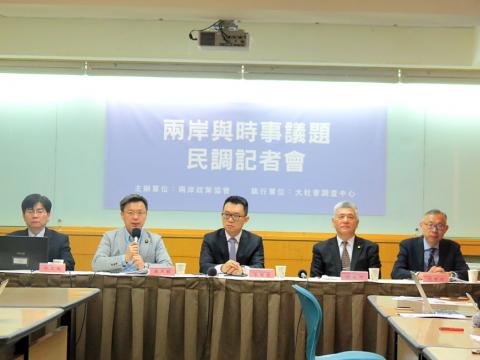Nearly 80 percent of Taiwanese regard Beijing as being hostile to Taiwan since President Tsai Ing-wen’s (蔡英文) inauguration in May last year, a sentiment that appears to transcend political boundaries, according to a survey released by the Cross-Strait Policy Association yesterday.
The poll found that 77.2 percent of respondents think China has been unfriendly to Taiwan since Tsai was sworn in, of which 43.8 percent believe it is “extremely inimical.”
A mere 15.3 percent of those polled considered Beijing as being amiable, while 7.5 percent declined to give an answer.

Photo: courtesy of the Cross-Strait Policy Association
An analysis of the results showed that Beijing’s hostile perception is shared by the public, regardless of their political affiliation, with 89.2 percent, 71.8 percent and 63.7 percent of respondents who identified themselves as pan-green supporters, pan-blue sympathizers and nonpartisan feeling that way respectively.
Conversely, 43.3 percent of respondents said that Tsai has demonstrated “just the right amount” of goodwill toward Beijing, followed by 38.1 percent who think she has shown “too little,” 10.1 percent who declined to answer and 8.5 percent who believe she has shown “too much.”
Responses to this question are closely related to respondents’ political inclinations, although those who identified as nonpartisan were divided between “too little” at 38.7 percent and “just the right amount” at 35.2 percent, the association said.
However, nearly 70 percent of those polled expressed support for Tsai’s cross-strait policy, which is centered on her pledge to maintain the “status quo” across the Taiwan Strait and forge a relationship with Beijing that is “consistent, predictable and sustainable,” while 24 percent were against the policy.
As for Beijing setting Tsai’s acknowledgement of the so-called “1992 consensus” as a nonnegotiable precondition for cross-strait exchanges, 67.8 percent of respondents said that it is unacceptable, while 25.3 percent felt otherwise.
Beijing has imposed a number of punitive measures against Taipei over the Tsai administration’s refusal to accept the “1992 consensus,” including the suspension of cross-strait dialogue and a cut to the number of Chinese tourists to Taiwan.
Few improvements in cross-strait ties have been seen, despite the president’s repeated reassurances that her government would not renege on its promise to maintain the “status quo.”
The “1992 consensus” refers to a tacit understanding between the Chinese Nationalist Party (KMT) and the Chinese government that both sides acknowledge that there is “one China,” with each side having its own interpretation of what “China” means. Former Mainland Affairs Council chairman Su Chi (蘇起) in 2006 admitted that he made the term up in 2000.
On domestic issues, 74.6 percent of respondents said that the Cabinet’s eight-year “Forward-looking Infrastructure Construction Project” is conducive to the nation’s development and economic growth, while 19.6 percent expressed opposition.
The initiative, unveiled earlier this month, calls for the government to spend NT$880 billion (US$29.1 billion) to improve five aspects of the nation’s economy: “green” energy, water resources, railways, digital infrastructure and urban and rural development.
The telephone-based survey collected 1,086 valid samples from Taiwanese aged 20 or older on Monday and Tuesday. It has a confidence level of 95 percent and a margin of error of 2.97 percentage points.

The Ministry of Education (MOE) is to launch a new program to encourage international students to stay in Taiwan and explore job opportunities here after graduation, Deputy Minister of Education Yeh Ping-cheng (葉丙成) said on Friday. The government would provide full scholarships for international students to further their studies for two years in Taiwan, so those who want to pursue a master’s degree can consider applying for the program, he said. The fields included are science, technology, engineering, mathematics, semiconductors and finance, Yeh added. The program, called “Intense 2+2,” would also assist international students who completed the two years of further studies in

Former president Tsai Ing-wen (蔡英文) departed for Europe on Friday night, with planned stops in Lithuania and Denmark. Tsai arrived at Taiwan Taoyuan International Airport on Friday night, but did not speak to reporters before departing. Tsai wrote on social media later that the purpose of the trip was to reaffirm the commitment of Taiwanese to working with democratic allies to promote regional security and stability, upholding freedom and democracy, and defending their homeland. She also expressed hope that through joint efforts, Taiwan and Europe would continue to be partners building up economic resilience on the global stage. The former president was to first

Taiwan will now have four additional national holidays after the Legislative Yuan passed an amendment today, which also made Labor Day a national holiday for all sectors. The Chinese Nationalist Party (KMT) and Taiwan People’s Party (TPP) used their majority in the Legislative Yuan to pass the amendment to the Act on Implementing Memorial Days and State Holidays (紀念日及節日實施辦法), which the parties jointly proposed, in its third and final reading today. The legislature passed the bill to amend the act, which is currently enforced administratively, raising it to the legal level. The new legislation recognizes Confucius’ birthday on Sept. 28, the

MORE NEEDED: Recall drives against legislators in Miaoli’s two districts and Hsinchu’s second district were still a few thousand signatures short of the second-stage threshold Campaigners aiming to recall Chinese Nationalist Party (KMT) legislators yesterday said they expect success in 30 out of 35 districts where drives have passed the second-stage threshold, which would mark a record number of recall votes held at once. Hsinchu County recall campaigners yesterday announced that they reached the second-stage threshold in the recall effort against Legislator Lin Szu-ming (林思銘). A total of 26,414 signatures have been gathered over the past two months, surpassing the 10 percent threshold of 23,287 in Hsinchu County’s second electoral district, chief campaigner Hsieh Ting-ting (謝婷婷) said. “Our target is to gather an additional 1,500 signatures to reach